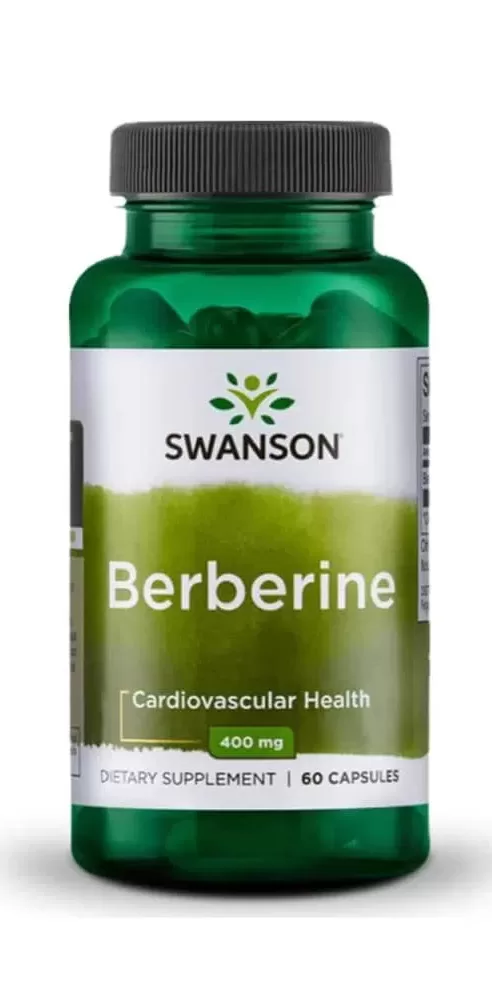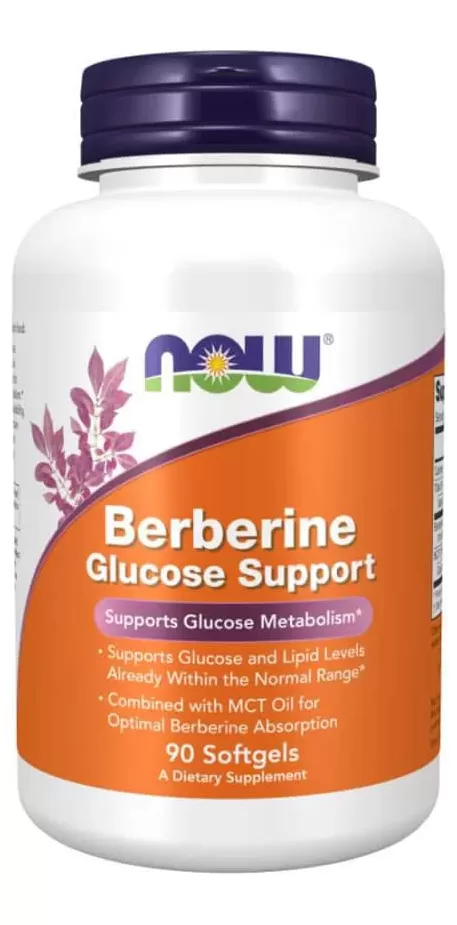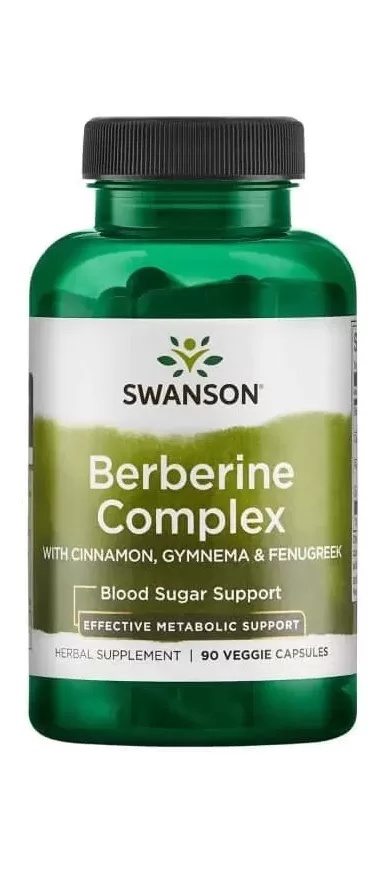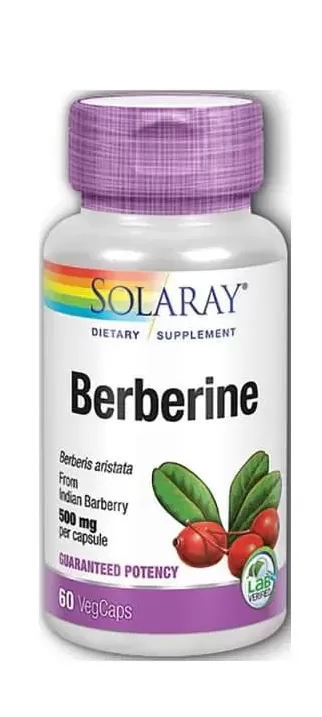The Ultimate Guide to Berberine Supplements (Review 2023)
What Is Berberine | Health Benefits | How It Works | Similar | Popular Products | FAQ | Warnings And Side Effects | Disclaimer
In today’s fast-paced world, taking charge of our health and well-being has become a top priority. If you’re looking for natural remedies and supplements to enhance your vitality, you’re in the right place. In this comprehensive guide, we’re going to explore the wonders of Berberine. We’ll uncover its remarkable properties, unveil its incredible health benefits, and how it works in our bodies. Whether you’re seeking to regulate your blood sugar levels, revitalize your cardiovascular health, boost your overall well-being, or even shed a few pounds, berberine might be the game-changer you’ve been looking for.†
![]()
What Is Berberine?
Berberine is a natural compound with immense potential for promoting health and well-being. It comes from various plants, such as barberry, Chinese goldthread, and goldenseal, and has centuries of traditional uses in Chinese and Ayurvedic medicine.

Chemically, berberine belongs to a class of compounds called alkaloids, known for their biological activities and therapeutic properties. So it’s unsurprising that Berberine offers a wide range of health benefits, making it a topic of great interest among researchers and health enthusiasts. These benefits stem from its remarkable antioxidant, anti-inflammatory, and antidiabetic properties, which make it a multifaceted and versatile compound for well-being. (1,2,3)
![]()
Health Benefits:
Berberine is a powerhouse of health benefits, offering a wide range of advantages for individuals seeking to improve their well-being naturally.
Let’s explore some of the remarkable ways that berberine can positively impact your health:
Blood Sugar Regulation:
Berberine has been extensively studied for its ability to regulate blood sugar levels. Research suggests that berberine can enhance insulin sensitivity, promote glucose uptake by cells, and inhibit enzymes involved in glucose production, resulting in improved glycemic control. (1,3,4,5)
Let’s explore how berberine works and why it is beneficial for maintaining healthy glucose levels.
- Enhanced Glucose Use: Berberine helps cells in the body use glucose more efficiently. It increases glucose uptake into cells, which helps lower blood sugar levels and provides energy for the body.†
- Reduced Sugar Production: Berberine can lower blood sugar by decreasing the liver’s glucose production. It does this by affecting the liver’s energy levels and function, which helps keep blood sugar levels in check.†
- DPP4 Inhibition: Berberine can inhibit an enzyme called DPP4, which breaks down hormones that help regulate insulin and glucose levels. By inhibiting DPP4, berberine allows these hormones to work longer, leading to better glucose control.†
- Improved Insulin Sensitivity: Berberine can enhance the body’s response to insulin, a hormone that helps regulate blood sugar levels. By improving insulin sensitivity, berberine helps cells take in glucose more effectively, reducing blood sugar levels.†
Cardiovascular Support:
Berberine exhibits cardiovascular benefits by helping to maintain healthy cholesterol levels and promoting heart health. Studies have indicated that berberine can lower total cholesterol, reduce LDL (bad) cholesterol, increase HDL (good) cholesterol, and decrease triglyceride levels. These effects contribute to a healthier lipid profile and may help reduce the risk of cardiovascular diseases. Additionally, berberine supports cardiovascular health by activating protective enzymes, regulating important pathways, and inhibiting harmful enzymes. Its effects help maintain and protect a healthy heart during challenging conditions like reduced blood flow. (1,3,6,7)
Anti-inflammatory and Antioxidant Effects:
Berberine acts as an antioxidant through various mechanisms. It can scavenge reactive species, bind to metals to transform certain substances, remove free oxygen radicals, reduce the harmful effects of superoxide ions and nitric oxide, and enhance the antioxidant effects of other substances. The antioxidant effect of berberine has been compared to that of vitamin C, a potent antioxidant. (1,3,8,9,10,11)
Weight Management:
Berberine shows promise in supporting weight loss and healthy weight management. Research suggests it may support regulating metabolism, increase fat burning, inhibit fat storage, and reduce appetite, all of which can contribute to weight loss and maintenance. (12,13)
Digestive Health:
Berberine has been traditionally used to support digestive health. It may help alleviate symptoms associated with gastrointestinal disorders, such as diarrhea, irritable bowel syndrome (IBS), and gut infections. Berberine’s antimicrobial properties also make it effective against certain pathogens that can cause digestive issues. (1,3,14)
Mental Well-being:
Emerging research suggests that berberine may have positive effects on mental health. It has shown potential in supporting cognitive function, alleviating symptoms of depression and anxiety, and protecting against age-related cognitive decline. While more research is needed in this area, preliminary findings are encouraging. (3,15,16)
Polycystic Ovary Syndrome Support:
Polycystic Ovary Syndrome (PCOS) is a hormonal disorder that affects many women, characterized by hormonal imbalances, irregular periods, cysts on the ovaries, and symptoms such as acne, weight gain, and excessive hair growth. While berberine is primarily known for its effects on blood sugar control and lipid metabolism, it also may assist in managing certain aspects of PCOS. (1732,1833,1934)
Here’s a closer look at how berberine may affect PCOS:
- Insulin Sensitivity: One of the key features of PCOS is insulin resistance, which can lead to high insulin levels in the body. Berberine has been shown to improve insulin sensitivity and reduce insulin resistance, thereby helping to regulate blood sugar levels. By enhancing insulin sensitivity, berberine may improve hormone balance and overall management of PCOS symptoms.†
- Hormone Regulation: PCOS is often associated with imbalances in sex hormones, including elevated levels of androgens, such as testosterone. Studies have indicated that berberine may help regulate hormone levels by reducing testosterone production and balancing estrogen levels. This can help alleviate symptoms like excessive hair growth and acne, commonly associated with PCOS.†
- Menstrual Regularity: Many women with PCOS experience irregular or absent menstrual cycles. Berberine may positively impact menstrual regularity by promoting ovulation and restoring normal hormonal fluctuations. By regulating the menstrual cycle, berberine may improve fertility for women with PCOS.†
- Inflammation and Oxidative Stress: PCOS is associated with chronic low-grade inflammation and increased oxidative stress. Berberine exhibits anti-inflammatory and antioxidant properties, which may help mitigate these underlying factors contributing to PCOS.†
It’s important to note that while berberine shows promising results in these areas, it should not replace any prescribed medications or medical advice. Always consult a healthcare professional before starting any new supplement regimen, especially if you have underlying health conditions or are taking medications.
![]()
How It Works:
Berberine exerts its effects through multiple methods of action in the body. Here are some key mechanisms by which berberine works.
Activation of AMPK:
Berberine activates AMPK, an enzyme that plays a crucial role in cellular energy regulation. When AMPK is activated, it enhances glucose uptake in cells, promotes the breakdown of glucose for energy, and stimulates fatty acid oxidation. This helps improve insulin sensitivity, regulate blood sugar levels, and support metabolic health. (1,2,11,13)
Modulation of Gene Expression:
Berberine influences the expression of various genes involved in metabolism and inflammation. It can increase the expression of genes associated with glucose uptake, lipid metabolism, and mitochondrial function while reducing the expression of genes involved in inflammation and lipogenesis (fat synthesis). This modulation of gene expression contributes to berberine’s overall metabolic and anti-inflammatory effects. (1,2,3,7,13)
Influence on Gut Microbiota:
Berberine has antimicrobial properties and can modulate the composition of the gut microbiota. It selectively inhibits harmful bacteria’s growth while promoting beneficial bacteria’s growth. This modulation of the gut microbiota can impact digestion, nutrient absorption, and overall gut health, contributing to the beneficial effects of berberine. (1,3,14)
Regulation of Gut Hormones:
Berberine can influence the secretion and activity of gut hormones involved in appetite regulation, such as glucagon-like peptide-1 (GLP-1). By increasing the release of these hormones, berberine may help promote feelings of fullness, reduce food intake, and support healthy weight management. (1,3,4,13,20)
Impact on Cellular Signaling Pathways:
Berberine can modulate various cellular signaling pathways, including those involved in glucose and lipid metabolism. It affects the activity of proteins and enzymes involved in these pathways, such as AMPK, mTOR (mammalian target of rapamycin), and PPARs (peroxisome proliferator-activated receptors). By influencing these signaling pathways, berberine helps regulate cellular processes related to metabolism and energy balance. (1,3,11,13,21)
It’s important to note that berberine’s precise mechanisms of action can vary depending on the specific health condition or biological context. Additionally, the extensive crosstalk between these mechanisms contributes to the overall therapeutic effects of berberine. Researchers continue to investigate and deepen our understanding of Berberine’s method of action to comprehend its potential benefits and applications in healthcare fully.
![]()
Similar To Berberine Supplements:
Several natural compounds share similarities with berberine regarding their potential health benefits and mechanisms of action. While they may not be identical, they exhibit comparable properties that make them worth exploring.
Here are a few natural compounds that have similarities to berberine:
- Curcumin
- Resveratrol
- Quercetin
- EGCG
Curcumin is the active compound found in turmeric, a widely used spice with potent medicinal properties. Like berberine, curcumin has demonstrated antioxidant, anti-inflammatory, and antimicrobial effects. It also shows promise in promoting cardiovascular health, supporting blood sugar regulation, and potentially aiding in weight management. Both berberine and curcumin modulate various signaling pathways and have been extensively studied for their therapeutic potential. (22,23,24)
Resveratrol is a compound found in grapes, red wine, and certain berries. It has gained attention for its antioxidant and anti-inflammatory properties and potential benefits for cardiovascular health. Resveratrol activates pathways like berberine, such as AMPK, which plays a role in glucose metabolism and energy regulation. It also shows promise in supporting brain health, longevity, and weight management. (25,26,27)
Quercetin is a flavonoid in various fruits, vegetables, and herbs. Like berberine, quercetin exhibits antioxidant, anti-inflammatory, and antimicrobial properties. It has been studied for its potential benefits in cardiovascular health, immune function, and allergy relief. Quercetin also shows promise in supporting blood sugar regulation and may have anticancer properties. (28,29,30)
EGCG:
Epigallocatechin gallate (EGCG) is a catechin found in green tea. It shares similarities with berberine regarding its antioxidant, anti-inflammatory, and metabolic properties. But, EGCG has been studied for its potential benefits in cardiovascular health, weight management, and cognitive function. It also shows promise in supporting blood sugar regulation and may protect against certain diseases. (31,32,33,34)
![]()
Popular Products:
As the popularity of berberine continues to rise due to its potential health benefits, the market is flooded with various berberine supplements claiming to provide exceptional results. However, choosing the right one amidst the sea of options can be overwhelming. In this section, we will review some popular berberine supplements available today.
- Swanson Berberine
- NOW Berberine
- Solaray Berberine
- Swanson Berberine Complex
 Swanson Berberine is a high-quality berberine supplement that provides 400 mg of pure berberine HCl per serving. Made from Berberis aristata root standardized to 97% berberine HCl, this product offers reliable and consistent dosage. With 60 servings per container, it’s a convenient and effective option for those seeking the potential benefits of berberine.†
Swanson Berberine is a high-quality berberine supplement that provides 400 mg of pure berberine HCl per serving. Made from Berberis aristata root standardized to 97% berberine HCl, this product offers reliable and consistent dosage. With 60 servings per container, it’s a convenient and effective option for those seeking the potential benefits of berberine.†
How To Take Swanson Berberine:
The manufacturer recommends taking one (1) capsule one to two times per day with a meal.
Customer Review By Britney: “Since incorporating Swanson Berberine into my routine, I’ve noticed a positive impact on my energy levels and overall glucose control. I feel more balanced throughout the day, with fewer energy crashes after meals. It has also helped me with managing my weight.”
 Now Foods Berberine Glucose Support Softgels offer comprehensive support for maintaining healthy glucose and lipid levels. Each softgel combines 400mg of Berberine HCl from Berberis aristata bark with 700mg of MCT Oil (Medium-Chain Triglycerides) for optimal absorption. With 90 softgels per bottle, this product provides a convenient and effective way to incorporate Berberine into your wellness routine.†
Now Foods Berberine Glucose Support Softgels offer comprehensive support for maintaining healthy glucose and lipid levels. Each softgel combines 400mg of Berberine HCl from Berberis aristata bark with 700mg of MCT Oil (Medium-Chain Triglycerides) for optimal absorption. With 90 softgels per bottle, this product provides a convenient and effective way to incorporate Berberine into your wellness routine.†
How To Take NOW Berberine:
The manufacturer recommends taking one (1) soft gel three times daily with food. Store in a cool, dry place after opening.
Customer Review By Jerry: “I was recommended this product by my physician for my blood sugar levels and it has worked like a charm so far. I have also noticed that my appetite has been suppressed slightly, as well.”
Solaray Berberine is a high-quality supplement that provides 500mg of berberine HCl derived from Indian Barberry (Berberis aristata) root extract. With 60 softgels per bottle, this formula ensures you receive a consistent and potent dosage of berberine to support your health and well-being.†
How To Take Solaray Berberine:
The manufacturer recommends taking one (1) Veg Cap daily with a meal or glass of water.
Store in a cool, dry place.
Customer Review By Betty: “This product lives up to its name. Works really well for what it claims.”
 Swanson Berberine Complex is a powerful supplement designed to support healthy glucose metabolism. It combines the benefits of berberine HCL sourced from Berberis aristata root with Ceylon Cinnamon, Fenugreek Seed, and Gymnema Sylvestre Leaf. With 90 servings per container, this formula provides a balanced blend of ingredients known for their ability to promote optimal glucose regulation and overall well-being.†
Swanson Berberine Complex is a powerful supplement designed to support healthy glucose metabolism. It combines the benefits of berberine HCL sourced from Berberis aristata root with Ceylon Cinnamon, Fenugreek Seed, and Gymnema Sylvestre Leaf. With 90 servings per container, this formula provides a balanced blend of ingredients known for their ability to promote optimal glucose regulation and overall well-being.†
How To Take Swanson Berberine Complex:
The manufacturer recommends taking one (1) veggie capsule daily with food and water.
Customer Review By Matt: “This product was recommended to me by my doctor to combat my prediabetes, hashimoto thyroid, and weight gain. It keeps my blood sugar balanced, is helpful for digestion and I’ve even lost a couple pounds. I definitely recommend this if you have any of these conditions or just need a boost.”
![]()
Berberine FAQ:
In this section, we’ll address some common questions related to Berberine and its uses.
What Is The Recommended Dosage For Berberine Supplements? |
|---|
| The recommended dosage of berberine can vary depending on the specific product and individual needs. However, a common dosage range is 500-1500 mg daily, typically divided into two to three doses. It’s best to follow the instructions provided by the manufacturer or consult with a healthcare professional for personalized dosage recommendations.† |
Are There Any Side Effects Associated With Berberine Supplements? |
| While berberine is generally well-tolerated, it can cause certain side effects in some individuals. These may include gastrointestinal discomfort, such as diarrhea, constipation, or abdominal pain. It may also interact with certain medications, particularly those metabolized by the liver.† |
Berberine VS Metformin: |
| Berberine and metformin are commonly used for managing blood glucose and increasing insulin sensitivity. However, metformin is a prescription medication widely available in various formulations and strengths. On the other hand, Berberine is a natural compound derived from certain plants and is often available as a dietary supplement. Despite their differences in structure and availability, they share many features, including benefits for treating conditions like diabetes, obesity, cardiac diseases, and inflammation. Unfortunately, metformin has a higher incidence of side effects than berberine and a higher potential for drug interactions. (17,35) |
Can I Import Berberine Supplements? |
| Importing berberine supplements can vary depending on the regulations and restrictions of the country you reside in. Researching and understanding your country’s specific import laws and regulations regarding dietary supplements, including berberine, is important.
Some countries may have restrictions or require certain permits or documentation for importing dietary supplements. It is advisable to check with your country’s customs authority or relevant government agencies to ensure compliance with import regulations. |
Can You Take Berberine With Other Supplements? |
| Berberine can generally be taken with other supplements, but it is important to consider potential interactions. Some supplements may have similar effects or interact with berberine, which could lead to unintended side effects or reduce the effectiveness of either supplement. For example, berberine may interact with medications or supplements that affect blood sugar levels, such as insulin or other antidiabetic drugs, potentially causing hypoglycemia (low blood sugar).† |
![]()
Wrapping Up!
And this marks the end of our post on Berberine Supplements. Thank you for reading! And as always, if there was something that wasn’t clear, another question you might have, or if you have another idea for a blog, Email Us!
Are you looking for more to read? Check out some of our other blogs!
![]()
Warnings And Side Effects:
For adults only. Do not take this product if you are pregnant or nursing. Consult your physician before using this or any product if you are taking medication or have a medical condition. Keep out of reach of children.
Do not use it if the seal is broken. Store in a cool, dry place.
![]()
Disclaimer:
†Please note the intention of the information provided is for reference only. Furthermore, we are in no way providing medical advice or instruction. Instead, the information provided in this guide/blog utilizes anecdotal information and available studies/reviews. While we aim to maintain and display accurate information, we can’t guarantee it represents the latest product formulation or information. Therefore, please visit the manufacturer’s website if you have any concerns. Also, the information above does not represent our views here at Same Day Supplements. Instead, these are the manufacturers’ and users’ views and information. Additionally, the Food and Drug Administration has not evaluated these statements. Finally, these products aim not to diagnose, treat, cure, or prevent disease or illness.


